Java for Cybersecurity & Remote Work
Hey there, remote work enthusiasts! Today, we’re diving into the world of Java and its importance in the realm of cybersecurity. As we all know, remote work has become increasingly popular in recent years, and with that comes the need for robust security measures to protect sensitive data. Java, with its versatility and powerful features, plays a crucial role in ensuring the safety of remote work environments. So, let’s explore how Java can help keep your remote work setup secure!
1. Java’s Strong Security Features
When it comes to cybersecurity, Java has got your back. It offers a wide range of security features that make it a top choice for developers and organizations alike. One of the key features is its built-in security manager, which acts as a gatekeeper, controlling access to various resources within the Java Virtual Machine (JVM). This helps prevent unauthorized access and protects against potential security vulnerabilities.
Additionally, Java provides a robust set of APIs (Application Programming Interfaces) for implementing secure communication protocols, such as SSL/TLS, which encrypt data transmission over networks. This ensures that your remote work communications are encrypted and protected from prying eyes.
Furthermore, Java’s security architecture includes features like code signing and sandboxing, which help prevent the execution of malicious code and protect against potential malware attacks. These features are especially important in remote work scenarios, where employees may be accessing various networks and systems from different locations.
2. Java’s Role in Remote Work Collaboration
Remote work often involves collaboration among team members who may be located in different parts of the world. Java, with its cross-platform compatibility, enables seamless collaboration by allowing developers to write code once and run it on multiple platforms. This means that regardless of whether your team members are using Windows, macOS, or Linux, they can all work together using Java-based applications.
Moreover, Java’s extensive libraries and frameworks provide developers with a wide range of tools for building collaborative applications. For example, Java’s Remote Method Invocation (RMI) allows objects to invoke methods on remote objects, making it easier for teams to work together on shared projects. Additionally, Java’s support for messaging protocols like JMS (Java Message Service) enables real-time communication and data exchange among team members.
So, whether you’re working on a remote team project or collaborating with clients and stakeholders, Java empowers you to work efficiently and securely.
3. Java’s Contribution to Cybersecurity Tools
Java not only helps secure remote work environments but also plays a significant role in the development of cybersecurity tools. Many popular security tools and frameworks are built using Java, leveraging its robustness and scalability.
One such example is the popular open-source network security scanner, OWASP ZAP (Zed Attack Proxy). ZAP, written in Java, helps identify vulnerabilities in web applications and provides developers with the necessary tools to fix them. Its extensibility and powerful API make it a favorite among cybersecurity professionals.
Another notable Java-based cybersecurity tool is Apache Shiro, a powerful and easy-to-use security framework that provides authentication, authorization, and session management capabilities. It simplifies the implementation of security features in Java applications, making it an excellent choice for securing remote work systems.
4. Java’s Continuous Updates and Support
Java’s commitment to security is evident in its regular updates and ongoing support. The Java community actively works on identifying and fixing security vulnerabilities, ensuring that Java remains a reliable and secure programming language.
Oracle, the company behind Java, releases regular security patches and updates to address any potential security issues. These updates not only enhance the security of Java itself but also provide developers with the latest tools and features to build secure applications.
Furthermore, Java’s vast community of developers and cybersecurity professionals actively contribute to the security ecosystem by sharing best practices, identifying vulnerabilities, and developing new security tools and frameworks. This collaborative effort ensures that Java remains at the forefront of cybersecurity in the remote work landscape.
Wrapping Up
Java is undoubtedly a powerhouse when it comes to cybersecurity in the realm of remote work. Its strong security features, role in collaboration, contribution to cybersecurity tools, and continuous updates make it an essential tool for remote workers and organizations.
So, whether you’re a developer working on secure remote work applications or an employee accessing sensitive data from a remote location, Java has got you covered. Embrace the power of Java and ensure the security of your remote work setup!
For more information on cybersecurity and remote work, check out our Keylogger article. Stay secure and stay remote!


